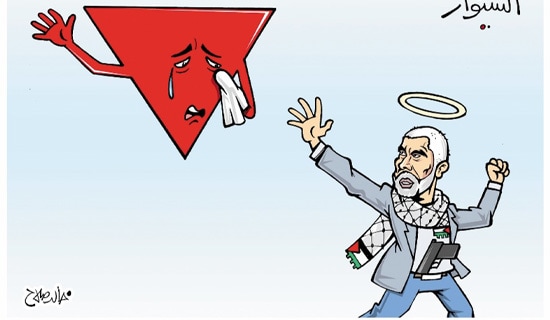The following are excerpts from an Iranian TV documentary on U.S. and U.K. soldiers who were captured and later released by Iran. The program aired on Al-'Alam TV on November 4, 2006.
TO VIEW THIS CLIP, VISIT: http://www.memritv.org/search.asp?ACT=S9&P1=1310
Voice-over: "The inability of the [U.S.] Marines occupying Iraq to benefit from the [U.S. military] equipment and from the naval fleets in the northern Persian Gulf, as well as the weakness and fragility of the false propaganda of these forces, have, more than once, led to devastating failure."
Admiral Ali Fadavi, Deputy Commander, IRGC Navy: "For some time the Americans have encountered this problem, especially when they wanted to enter the Arvand River 30 km from the estuary. They entered our territorial waters, and then our forces captured them."
Captain Seifollah Bakhtiarvand, Deputy Commander, Third Naval Region, IRGC: "The commander of Arvand saw that the Americans wanted to enter our territorial waters, and that they actually did enter them. His response was swift, and he captured the Americans, although he did not have sufficient forces. He described the event: 'When we reached them, one of them took his weapon and threw it down in the boat, merely because one of us shouted Allah Akbar.'"
Admiral Ali-Reza Tanksiri, Commander, Third Naval Region, IRGC: "They wore the Revolutionary Guards uniforms and shouted 'Allah Akbar.' When the [Americans] saw their determination and heard their cries, they realized that they were from the Revolutionary Guards. One of the Iraqis with them explained that they should not fight the Revolutionary Guards."
Captain Seifollah Bakhtiarvand: "They saw a boat heading toward our territorial waters in the Arvand River. They surrounded it, and led it to our port. When the American Marines disembarked, one of them peed on himself out of fear."
Admiral Ali Fadavi: "The truth is that 'Marines' means 'defeated man.' When he faces forces of believers and he realizes where he is, he is so scared that he pees on himself."
Admiral Ali-Reza Tanksiri: "They raised their hands, and then one of them peed on himself. It was obvious that they were very scared. The enemies' cowardice was to that extent."
Title: "The Capture of British Soldiers and American Marines, June 2004"
Admiral Ali Fadavi: "For many years, the Americans have been spreading propaganda for their forces, as a form of psychological warfare. As I have often said, America is not a superpower. All they have is propaganda. This is what they are strong at. We, on the other hand, rely on the hadith: 'The believer is everything, and the infidel is nothing.'
"There were 13 people on board the boats. Six of them were Americans, and the others were contractors of the American forces."
Admiral Ali-Reza Tanksiri: "We held them for no more than 24 hours, and then it was decided to release them.
"Our forces, which are stationed along the coast of the Abadan region, and along the banks of the estuary of the Arvand River in the Persian Gulf, detected movements in the Iraqi territorial waters."
Admiral Ali Fadavi: "Near the Al-Omaya region, there were three military boats, coming near our territorial waters in the Arvand River. The boats came from Khor Abdullah."
Captain Abolqasem Amankah, Commander, Arvand Naval Base: "I was holding a routine meeting with my forces in the base. Suddenly I was informed that three foreign boats were approaching our waters, and that they were coming from Iraqi waters.
"The first [Iranian] boat moved toward the target. I was in the second boat, which joined it. By the time we got there the base commander had control of the situation, and had caught the infiltrators, and he directed [the boat] to where we wanted.
"We captured them in our territorial waters."
Captain Seifollah Bakhtiarvand: "The time was approximately 11 a.m. Usually we are prepared to deal with any event, but this time, we were on a break. We are in constant confrontation with the American and British boats. We always expected something worse than this to happen. They called me and informed me that they had captured three British boats that had infiltrated our territorial waters."
[...]
[Footage of the boats being captured.]
[...]
Captured British soldier A: "To my family, I am sorry. They're waiting at home worried. To the government, to my boss, I'm sorry for my mistake. To the Iranian people, I am very, very sorry for the mistake. It will never happen again. I will never forget this. This has been a very good lesson to me. I will not do it again. I will tell them the same thing: I made a mistake. But the Iranian people are very good people. That is the first time I have met Iranian people. They have been very kind. I understand that we have to investigate this matter, and, hopefully, it will be resolved, and I can go home, back to Iraq... And back to the U.K."
Captured British soldier B: "As far as I'm aware, the GPS wasn't working properly, so we were going by the chart work. The chart work was on the other boat that I wasn't on, so I didn't have access to the charts, so I didn't know exactly where we were driving the boats. I think that the way we would deal with anybody entering our waters is very much the same as how you did. We would take the same steps. Yes, pretty much the same. We would treat them how you treated us, which is very, very well. Very nice people. So we would do pretty much the same as you have done."
[...]
[The captured soldiers give their names to the camera.]








